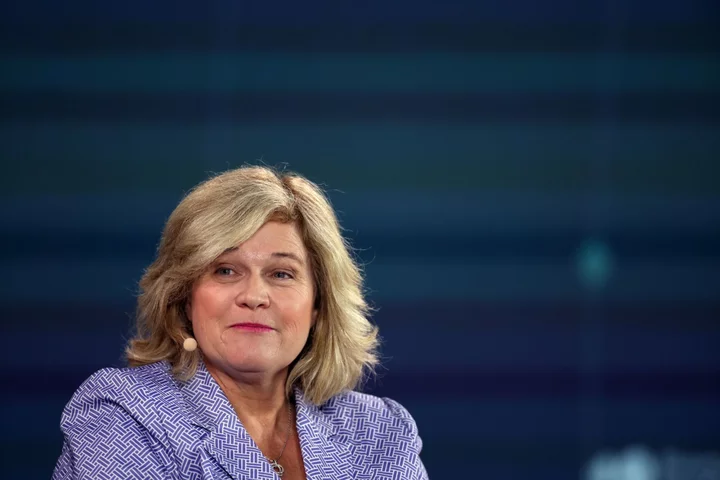War, geopolitical tension and inflation were among the litany of risks identified by political and business leaders speaking at the Bloomberg New Economy Forum in Singapore on Wednesday.
The world is facing a “moment of danger” with wars in Ukraine and Gaza and “tripwires” that could trigger conflict in Taiwan and the South China Sea, Singapore Foreign Minister Vivian Balakrishnan said as the three-day event got underway. “I’m very uncomfortable.”
But beyond the sprawling risks, there were glimmers of optimism that some of the tensions gripping the globe could abate. Speaking days before US President Joe Biden is expected to meet Chinese leader Xi Jinping for key talks on the sidelines of the Asia-Pacific Economic Cooperation summit in San Francisco, Chinese Vice President Han Zheng said recent high-level meetings send a positive signal for the world.
“Pragmatism is surfacing,” Khalid Al-Falih, Saudi Arabia’s minister of investment, said of the increasing exchanges between the US and China.
Al-Falih said Saudi Arabia’s talks on normalizing ties with Israel remain on the table but have always been “contingent on a pathway to a peaceful resolution of the Palestinian question.”
“Obviously the setback over the last month has clarified why Saudi Arabia was so adamant that resolution of the Palestinian conflict has to be part of a broader normalization in the Middle East,” Al-Falih said on a panel moderated by Stephanie Flanders.
In coming days, Saudi Arabia will convene separate summits with Arab nations, African countries and Islamic nations. In the short term, the objective of these three summits and other gatherings, under the leadership of Saudi Arabia, is to drive toward peaceful resolution of the conflict, Al-Falih said.
“What’s beyond it is an imperative for countries in the Middle East to work toward prosperity of the people and the economy,” he said.
Israel has four almost contradictory tasks in the ongoing Israel-Hamas war, said Tom Nides, a former US Ambassador to Israel and Wall Street veteran. They include removing Hamas from Gaza, essential for the security of both Israel and the wider region; finding the hostages likely held in tunnels under Gaza; keeping Iran-backed Hezbollah out of the conflict; and protecting innocent lives.
“Israel’s got a very tough road here in the next 30 days and beyond,” said Nides, who stepped down last month as vice chairman at Wells Fargo & Co. to focus on the Middle East. Hamas is designated as a terrorist organization by the US and the European Union.
‘Glimmers of Hope’
Getting past immediate challenges will be crucial, Singapore’s Balakrishnan said.
“If we get a world that’s caught up in a war and distracted in ultimate strategic dead-ends, it’s going to be a world which is unstable, hyper-inflationary, disrupted and war will be the defining feature,” he said. “Now, if we can avoid that, take a deep breath, and somehow get through the next six months to a year, avoiding that disaster, then actually I see glimmers of hope.”
On the investment front, thawing US-China ties could give beaten-down Chinese equities an opportunity for gains, according to the chief investment officer of Templeton Global Equity Investments.
A Xi-Biden meeting “could provide a temporary floor in China equities,” Manraj Sekhon said in a Bloomberg Television interview on the sidelines of the NEF.
Portfolio diversification is a top priority for Franklin Templeton as markets cope with high interest rates and sticky inflation, President and CEO Jennifer Johnson said. China is one region that global investors still shouldn’t ignore and Franklin Templeton’s emerging market team is definitely buying back into the country, she said. “This is just a great price.”
For John Waldron, president and chief operating officer of Goldman Sachs Group Inc., inflation remains the single-biggest risk to the global economic outlook.
“I think inflation is far and away my biggest concern,” Waldron said. “We have spent a lot of time at our firm worrying about a longer-run implication towards inflation, and how they will probably create a lower growth environment.”
Lim Chow Kiat, CEO at GIC Pte, sees that as a chance to buy. Markets haven’t seen the current yield on 10-year Treasury inflation protected securities of around 2.5% for “a long time,” Lim said on a panel at the forum. “That’s very attractive I would say and that is actually great competition for other asset classes.”
Noel Quinn, CEO of HSBC Holdings Plc, also pointed to the global economy’s struggle with high inflation and interest rates.
The New Economy Forum is being organized by Bloomberg Media Group, a division of Bloomberg LP, the parent company of Bloomberg News.
Read More from the New Economy Forum:
- Goldman’s Waldron Sees Inflation as Top Risk That GIC Calls Buy
- Singapore Sees ‘Moment of Danger’ as Wars, Tensions Divide World
- Saudi Minister Says Israel Talks Hinge on Palestinian Question
- China Vice President Sees ‘Positive Signals’ in Ties With US
- Templeton Says Biden-Xi Meeting May Be Catalyst for China Stocks
- Goldman, GIC Differ on Whether Inflation Is Risk or Opportunity
--With assistance from Adam Haigh, Philip J. Heijmans and Clarissa Batino.
Author: Malcolm Scott, Rebecca Choong Wilkins and Chanyaporn Chanjaroen

